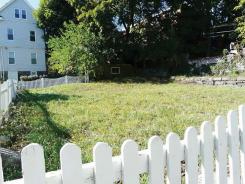May 14, 2015
 18-19 Windermere Road
18-19 Windermere Road
The Boston Committee of the Garden Clubs of America (GCA) is celebrating its 25th anniversary with a $25,000 seed grant for a community garden on Windermere Rd. in Uphams Corner. The Trustees of Reservations, which recently merged with Boston Natural Areas Network, will develop the project.
GCA committee chair Barbara Millen presented the grant during a gala last Wednesday evening (May 6) at Shirley-Eustis House. Millen said the garden club committee chose the historic venue because of its proximity to Uphams Corner and the site of the new garden.
“The Windermere Road project will be integral to the Fairmount Greenway,” Millen said. On an easel beside her, a map pinpointed the site among the community gardens, bike trails and other green spaces planned for neighborhoods in Dorchester, Mattapan and Hyde Park along the Fairmount-Indigo commuter line – collectively known as the Fairmount Greenway.
Conrad Crawford expressed thanks on behalf of The Trustees of Reservations.
“People think of us as being outside the city, but we are also interested in protecting vacant land inside the city,” said Crawford, who is the new director of TTOR’s Boston region. The largest conservation organization in Massachusetts, TTOR boasts 40,000 members and 113 sites under protection, he said. The merger with BNAN adds 60 community gardens it owns and manages in Boston, its educational programs and its expertise in engaging city residents in gardening.
Shirley-Eustis House, built in 1740 for the governor of the Massachusetts Colony, is less than half a mile from the Windermere Rd. site, said Crawford. The original property comprised 30 acres of farm fields and pear orchards.
“Now the area where the new garden will be is one of the most densely populated parts of the city,” he said.
The city is providing the land, measuring approximately 4100 sq. ft., and will budget $75,000 toward the total estimated cost of $145,000. TTOR is working to raise the remaining $45,000 needed to complete construction by November, Crawford said. The seed money has come mainly from garden club members, but also from businesses in the neighborhood around the garden site, Millen said. She solicited business owners in part to raise awareness and enlist their support.
Jeremy Dick, superintendent for the Boston region of TTOR, is managing the project.
“We are partnering with the Jones Hill Neighborhood Association to bring residents and community-oriented people out for the design process,” said Dick. In the next few weeks his staff will hold a series of meetings with residents to learn what they would like to see in the garden. A conceptual design and rendering should be ready in June. Landscape architect Ray Dunitz will then turn the residents’ vision into the actual design.
The property is sloped. Thus Dick envisions a tiered garden with 12-15 individual plots for residents, and raspberry and blueberry bushes on the slope. The core will be a seating area that can also be used for community meetings or educational programs, Dick said.
The Boston Committee of the GCA was formed in 1989 by garden clubs in surrounding communities. Its mission is to raise money for the Blossom Fund, which makes seed grants for projects in Boston. Past grants have gone to projects in the Arboretum, on the Esplanade and in Christopher Columbus Park, among others. “When Boston thrives, we believe surrounding communities benefit,” said Millen.
She was excited when the committee proposed the Windermere Garden for the present grant. A nutritionist, Millen recently served as chair of the U.S. Dietary Guidelines Advisory Committee to the Department of Health and Human Services. That committee’s report called for creating “cultures of health” in homes, workplaces neighborhoods and schools. “A community garden not only raises food. It also makes neighborhoods more appealing,” Millen said. “That brings people out and makes neighborhoods safer for exercise, biking and walking to the commuter rail.”
“Seed grants can do big things,” added Michele Hanss, a previous head of the Boston Committee of GCA. Seed money can attract larger donors and induce businesses to support a project as well. “We get a project in the ground where it can grow,” she said.


